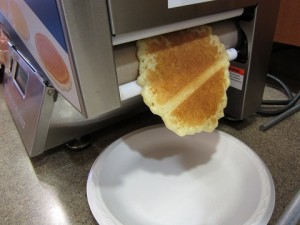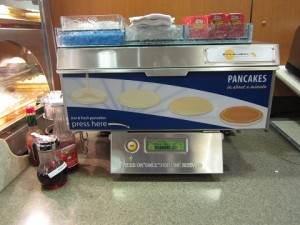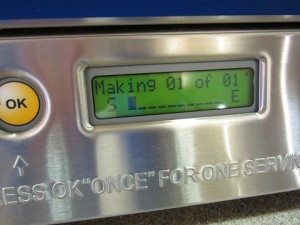When I was growing up, our fun-loving mom served pancakes every Saturday morning, inviting the neighbor kids to join us. She urged us to see who could eat the most, churning out pancakes by the dozen. When I eventually had a kitchen table full of my own children, I carried on the same Saturday morning ritual.
This weekend, in a hotel breakfast nook (eating the free meal that frequently comes with room rental), I learned how pancake-making has reached a new level. Never before had I seen a machine that could turn out fresh 6” pancakes with the push of one button.
It was automated assembly-line flapjacks, and the only thing we had to do was be ready with a plate at the end of the  line. Mom would have loved it, the mess-free marriage of chef-ing and tech-ing.
line. Mom would have loved it, the mess-free marriage of chef-ing and tech-ing.
If only every life problem could be solved so easily. One-two-three done.
In our efforts to problem-solve, we usually set out steps to follow: first, then next, then eventually, then bingo: solution.
Trouble comes when the end result isn’t what we expected. With the pancake maker, we wait 1 minute while staring at a picture of a fluffy pancake, and after traveling through the short, prescribed steps, it produces what’s been promised.
The problem with life’s dilemmas is twofold: we often don’t know what steps we should take, and even when we know, the result might take us by surprise, like a pancake machine spitting out a muffin.
Interestingly, God is often the one intentionally rearranging the order of our one-two-three’s and setting up those end-surprises. As frustrating as this can be for us, he does it hoping to teach us things we need to know or to reverse our march toward destruction.
We stomp our feet and say, “But one-two-three just has to lead to four! It can’t work any other way!”
If we put God in charge, however, it means saying yes to a bit of uncertainty. His supernatural reasons for doing things don’t resemble our natural ones. They’re better, higher, finer than ours. The only question we have to ask is, “Do I want God’s superior steps with their element of uncertainty or my inferior ones based on human logic?”
He knows that when we sign on with him not knowing where or how he’s going to lead, we feel uneasy. Though he may not eliminate that part of it, he does provide some comfort by letting us see his plan in hindsight. As we do, we’re encouraged to say, “Ok, your way again next time.”
And with enough practice, that ok becomes almost as easy as pushing the ok button on a pancake maker.
“O Lord my God… Your plans for us are too numerous to list. You have no equal. If I tried to recite all your wonderful deeds, I would never come to the end of them.” (Psalm 40:5)


